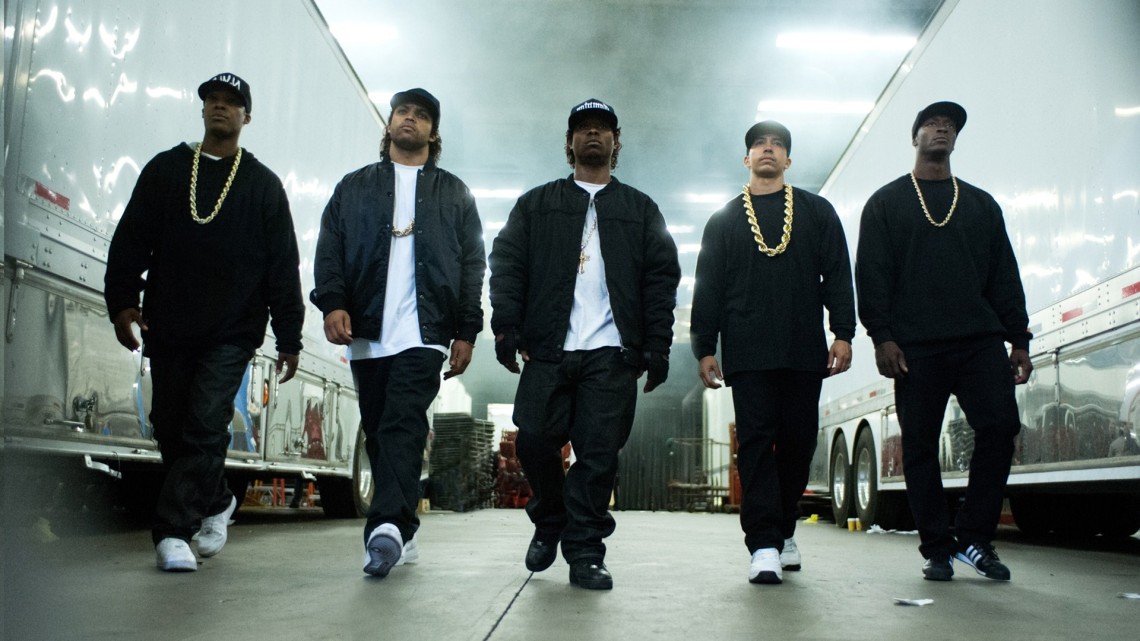In one scene, deep in the overstuffed second act of F. Gary Gray’s ambitious N.W.A. biopic Straight Outta Compton, Ice Cube (played by O’Shea Jackson Jr., the real-life fruit of Mr. Cube’s loins) goes to settle a dispute with his manager. The overcooked noodle of a man has attempted to short Cube of some of the money he’s owed from sales of his solo debut, AmeriKKKa’s Most Wanted. In the era before hip-hop, an aggrieved artist might arrive flanked by a phalanx of lawyers, but Cube learned how to squash beef on the streets of the active war zone known as Compton. He shows up with a few of the guys in his crew and goes to work on the pristine Los Angeles office, using an aluminum bat to smash the gold records hanging on the walls. It is both terrifying and kind of exhilarating. That is how it feels to listen to N.W.A.
To watch Cube smack the paperweights off his manager’s desk is to bear witness to the collision of black America’s everyday realities with a white-dominated cultural mainstream. Straight Outta Compton is at its most compelling when approaching gangsta rap as a ethnological movement, an aggressive genre of urban pessimism that connected the dead ends of youth in ghettoized areas to suburban cul-de-sacs. Life has not prepared Ice Cube, or his fellow members of hip-hop supergroup Niggaz Wit Attitudes, for the sudden windfall of fame and fortune that accompanies their debut album, which also lends the film its title. Like Mark Zuckerberg showing up to board meetings in flip-flops, they burn a swath of impropriety through a cultural-financial institution that understands nothing about them outside of their untapped depths of profitability. But this isn’t Facebook, and the likes of Ice Cube, Eazy-E (Jason Mitchell), and Dr. Dre (Corey Hawkins) don’t come wearing hoodies. This is the rap game, and they arrive strapped up with AK-47s.
The racial dynamics, more relevant now than ever in the wake of the neverending parade of heinous crimes that police perpetrate on black citizens daily, generally leaven what would otherwise be another paint-by-numbers band biopic. The group has raw talent, the degree of natural skill that sharks like manager Jerry Heller (Paul Giamatti, pretty much continuing his role from this summer’s Love & Mercy) can smell like blood in the water. Foreseeing a great spike in rap’s public viability, Heller signs the collection of hungry youngsters and sets them on the fast path to stardom. The usual pitfalls — egos, infighting, overindulgence — give them pause, and eventually lead to a mass splintering when Dre and Cube go solo as Eazy-E succumbs to the ravages of HIV.
Though that’s quite a reductive plot summary; longtime N.W.A. affiliate Gray shoehorns nearly every memorable event from the rich and varied history of E, Cube, Dre, MC Ren, DJ Yella, and the panoply of stars that came into their orbit into the film’s bloated two-and-a-half-hour run time. In some instances, the recognition alone provides the kick that Gray evidently believes it will, such as the awe-inspiring recreation of N.W.A.’s epochal “Wet and Wild” pool party. (And let us cryogenically freeze Keith Stanfield now, so that future generations may have their own Snoop Dogg in the event that something happens to the original.) But too many scenes ought to have been left on the cutting room floor, from the protracted contract struggles with certified crazy person Suge Knight to the portentous blathering about something big and special being made in Compton.
To be fair, all the best ‘90s rap classics were overlong and a little indulgent. At least this one has the decency to pad out its runtime with genuine humor instead of skits; Jackson Jr.’s reading of “You’re kind of being a hoe right now, Eric” is a master class in deadpan comedy. It’s just one of the expressions of earnest personality that collectively elevate this film above its biopic brethren. Lifetime chronicles such as The Theory of Everything and The Imitation Game laid on the inspirational feel-goodery and uberdidactic themes thick and heavy. Straight Outta Compton flows around a number of similar beats, but as Cube prefaces a critical performance of “Fuck Tha Police”, it’s actually got something to say.




















